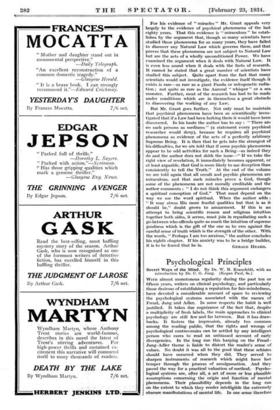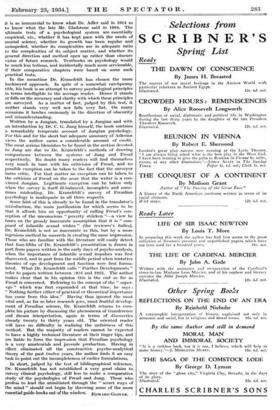Psychological Principles
Secret Ways of the Mind. By Dr. W. M. Kranefeldt, with an introduction by Dr. C. G. Jung. (Kogan Paul, 68.) WITH almost monotonous regularity during the past ten or fifteen years, writers on clinical psychology, and particularly those desirous of establishing a reputation for fair-mindedness, have devoted a considerable amount of space to reviewing the psychological systems associated with the names of Freud, Jung and Adler. In some respects the habit is well justified. It takes due cognizance of the fact that, despite a multiplicity of fresh labels, the main approaches to clinical psychology are still few and far between. But it has draw- backs. It fosters the impression, already too common among the reading public, that the rights and wrongs of psychological controversies can be settled by any intelligent person who cares to read an unbiassed account of early divergencies. In the long run this harping on the Freud- Jung-Adler theme is liable to distort the reader's sense of values. No doubt it was all to the good that these schisms should have occurred when they did. They served to sharpen instruments of research which might have lost temper through the process of amalgamation. And they paved the way for a practical valuation-ormetho& - Psycho- logical-systems are, after all, a set of more or less plausible assumptions concerning the origin and function of mental phenomena. Their plausibility depends in the long run on the extent to which they render intelligible the extremely obscure manifestations of mental life. In one sense therefore
it is as immaterial to know what Dr. Adler said in 1914 as to know what the late Mr. Gladstone said in 1864. The ultimate tests of a psychological system are essentially empirical, viz., whether it has kept pace with the needs of mental science, whether its growth has been regular and unimpeded, whether its complexities are in adequate ratio to the complexities of its subject matter, and whether its general direction and method open up rather than obscure vistas of future research. Textbooks on psychology would be much less tedious, and incidentally much more serviceable, if their comparative chapters were based on some such practical tests. • In the meantime Dr. Kranefeldt has chosen the more hackneyed approach. In spite of a somewhat catchpenny title, his book is an attempt to survey psychological principles in terms intelligible to the average reader. Hence it stands or falls on the accuracy and clarity with which these principles are surveyed. As a matter of fact, judged by this test, it neither stands very well nor falls very fiat. On many occasions it lurches ominously in the direction of obscurity and misunderstanding.
Written by a Jungian, translated by a Jungian and with an introduction by Dr. C. G. Jung himself, the book contains a remarkably temperate account of Jungian psychology. For this and for the short but adequate summary of Adlerian views the author earns a considerable amount of credit. The most serious blemishes to be found in the section devoted to Jung are due to Dr. Kranefeldt's methods of drawing comparisons between the systems of Jung and Freud respectively. No doubt many readers will find themselves very much in tune with his criticisms of Freud, and no possible exception can be taken to the fact that the surveyor turns critic. For that matter no exception can be taken to the criticism of Freud on the score that the writer is a con- vinced Jungian. Legitimate exception can be taken only when the survey is itself ill-balanced, incomplete and some- times misleading. Dr. Kranefeldt's survey of Freudian psychology is inadequate in all three respects.
Some hint of this is already to be found in the translator's introduction, the main justification for which seems to be that it affords him an opportunity of calling Freud's con- ception of the unconscious " poverty stricken "—a view he bases on the grossly inaccurate assumption that it is " com- posed of infantile sexual wishes " (the reviewer's italics), Dr. Kranefeldt is not so inaccurate as this, but by a more ingenious method he succeeds in creating the same impression. Those who are familiar with the literature will easily detect that four-fifths of Dr. Kranefeldt's presentation is drawn in part from papers written in the early days of psycho-analysis, when the importance of infantile sexual impulses was first discovered, and in part from the middle period when tentative theories of ego development and function were first formu- lated. What Dr. Kranefeldt calls " Further Developments " refer to papers written between 1918 and 1923. The author makes clear that in his opinion this is the end so far as Freud is concerned. Referring to the concept of the " super- ego " which was first expounded at that time, he says : " Nothing further either of practical or theoretical importance has come from this idea." Having thus ignored the most vital and, as far as later research goes, most fruitful develop- ment of Freudian science, Dr. Kranefeldt returns to com- plete his picture by discussing the phenomena of transference and dream interpretation, again in terms of discoveries already twenty to thirty years old. The oriented reader will have no difficulty in realizing the unfairness of this method. But the majority of readers cannot be expected to have a highly technical literature at their finger tips, and are liable to form the impression that Freudian psychology is a very amateurish and juvenile production. Having in effect eliminated all the constructive psycho-analytical theory of the past twelve years, the author finds it an easy task to point out the incompleteness of earlier formulations.
In short; judged by the test of bibliographical reference, Dr. Kranefeldt has not established a very good claim to survey clinical psychology, still less to make a comparative study of the psychologies of. Freud and Jung. Those who profess to lead the uninitiated through the " secret ways of the mind " should not begin by throwing some of the more essential guide-books_out of the window. ,EDWARD GLovint..

















































 Previous page
Previous page